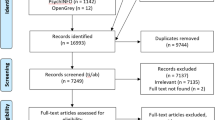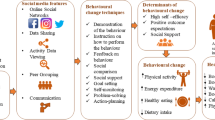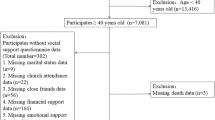Abstract
Social support is important to achieve beneficial changes in risk factors for disease, such as overweight and obesity. This paper presents the theoretical and practical framework for social support, and the mechanisms by which social support affects body weight. The theoretical and practical framework is supported with a literature review addressing studies involving a social support intervention for weight loss and weight loss maintenance.
A major aspect in social support research and practice is the distinction between structural and functional support. Structural support refers to the availability of potential support-givers, while functional support refers to the perception of support. Interventions often affect structural support, for example, through peer groups, yet functional support shows a stronger correlation with health. Although positive correlations between social support and health have been shown, social support may also counteract health behaviour change.
Most interventions discussed in this review showed positive health outcomes. Surprisingly, social support was clearly defined on a practical level in hardly any studies, and social support was assessed as an outcome variable in even fewer studies. Future social support intervention research would benefit from clear definitions of social support, a clear description of the intended mechanism of action and the actual intervention, and the inclusion of perceived social support as a study outcome.
This is a preview of subscription content, access via your institution
Access options
Subscribe to this journal
Receive 12 print issues and online access
$259.00 per year
only $21.58 per issue
Buy this article
- Purchase on Springer Link
- Instant access to full article PDF
Prices may be subject to local taxes which are calculated during checkout
Similar content being viewed by others
References
Adams J & White M (2005): Why don’t stage-based activity promotion interventions work? Health Educ. Res. 20, 237–243.
Amick TL & Ockene JK (1994): The role of social support in the modification of risk factors for cardiovascular disease. In Social Support and Cardiovascular Disease eds SA Shumaker & SM Czajkowski, pp 259–278. New York: Plenum Press.
Antonucci TC & Johnson EH (1994): Conceptualization and methods in social support theory and research as related to cardiovascular disease. In Social Support and Cardiovascular Disease eds SA Shumaker & SM Czajkowski, pp 21–39. New York: Plenum Press.
Berkman LF & Syme LS (1979): Social networks, host resistance, and mortality: a nine-year follow-up study of Alameda County residents. Am. J. Epidemiol. 109, 186–204.
Black DR, Gleser LJ & Kooyers KJ (1990): A meta-analytic evaluation of couples weight-loss programs. Health Psychol. 9, 330–347.
Bourgeois MS, Schulz R & Burgio L (1996): Interventions for caregivers of patients with Alzheimer's disease: a review and analysis of content, process, and outcomes. Int. J. Aging Hum. Dev. 43, 35–92.
Bovbjerg VE, McCann BS, Brief DJ, Follette WC, Retzlaff BM, Dowdy AA, Walden CE & Knopp RH (1995): Spouse support and long-term adherence to lipid-lowering diets. Am. J. Epidemiol. 141, 451–460.
Burke V, Giangiulio N, Gillam HF, Beilin LJ, Houghton S & Milligan RAK (1999): Health promotion in couples adapting to a shared lifestyle. Health Educ. Res. 14, 269–288.
Calfas KJ, Sallis JF, Zabinski MF, Wilfley DE, Rupp J, Prochaska JJ, Thompson S, Pratt M & Patrick K (2002): Preliminary evaluation of a multicomponent program for nutrition and physical activity change in primary care: PACE+ for adults. Prev. Med. 34, 153–161.
Clifford P, Tan S & Gorsuch RL (1991): Efficacy of a self-directed behavioral health change program: weight, body composition, cardiovascular fitness, blood pressure, health risk, and psychosocial mediating variables. J. Behav. Med. 14, 303–323.
Cohen S & Wills TA (1985): Stress, social support, and the buffering hypothesis. Psychol. Bull. 98, 310–357.
Cohen SJ, Halvorson HW & Gosselink CA (1994): Changing physician behaviour to improve disease prevention. Prev. Med. 23, 284–291.
Cohen S, Gottlieb BH & Underwood LG (2000): Social relationships and health. In Social Support Measurement and Intervention. A Guide for Health and Social Scientists eds S Cohen, LG Underwood & BH Gottlieb, pp 3–25. Oxford: Oxford University Press.
Connell CM & D’Augelli AR (1990): The contribution of personality characteristics to the relationship between social support and perceived physical health. Health Psychol. 9, 192–207.
Cutrona CE & Russell DW (1990): Type of social support and specific stress: toward a theory of optimal matching. In Social Support: An Interactional View eds BR Sarason, IG Sarason & GR Pierce, pp 319–366. New York: John Wiley & Sons, Inc.
Djuric Z, DiLaura NM, Jenkins I, Darga L, Jen CK-L, Mood D, Bradley E & Hryniuk WM (2002): Combining weight-loss counseling with the weight watchers plan for obese breast cancer survivors. Obes. Res. 10, 657–665.
Fleury J (1993): An exploration of the role of social networks in cardiovascular risk reduction. Heart Lung 22, 134–144.
Foreyt JP, Goodrick GK & Gotto AM (1981): Limitations of behavioral treatment of obesity: review and analysis. J. Behav. Med. 4, 159–174.
Hagen RL (1974): Group therapy versus bibliotherapy in weight reduction. Behav. Ther. 5, 222–234.
Hart J, Einav C, Weingarten MA & Stein M (1990): The importance of family support in a behavior modification weight loss program. J. Am. Diet. Assoc. 90, 1270–1271.
Heinrichs M, Baumgartner T, Kirschbaum C & Ehlert U (2003): Social support and oxytocin interact to suppress cortisol and subjective responses to psychosocial stress. Biol. Psychiatry 54, 1389–1398.
Helgeson VS & Gottlieb BH (2000): Support groups. In Social Support Measurement and Intervention: A Guide for Health and Social Scientist eds. S Cohen, LG Underwood and BG Gottlieb, pp 221–245. Oxford: Oxford University Press.
House JS, Landis KR & Umberson D (1988): Social relationships and health. Science 241, 540–545.
Hupcey JE (1998): Clarifying the social support theory-research linkage. J. Adv. Nurs. 27, 1231–1241.
Hupcey JE & Morse JM (1997): Can a professional relationship be considered social support? Nurs. Outlook 45, 270–276.
Jeffery RW, Gerber WM, Rosenthal BS & Lindquist RA (1983): Monetary contracts in weight control: effectiveness of group and individual contracts of varying size. J. Consult. Clin. Psychol. 51, 242–248.
Joseph DH, Griffin M, Hall RF & Sullivan ED (2001): Peer coaching: an intervention for individuals struggling with diabetes. Diabetes Educ. 27, 703–710.
Kahn RL (1994): Social support: content, causes, and consequences. In Aging and Quality of Life eds RP Abeles, HC Gift & MG Ory, pp 163–184. New York: Springer Publishing Company.
Kelsey K, Earp JAL & Kirkley BG (1997): Is social support beneficial for dietary change? A review of the literature. Fam. Community Health 20, 70–82.
Knox SS & Uvnäs-Moberg K (1998): Social isolation and cardiovascular disease: an atherosclerotic pathway? Psychoneuroendocrinology 23, 877–890.
Lakey B & Cohen S (2000): Social support theory and measurement. In Social Support Measurement and Intervention: A Guide for Health and Social Scientists eds S Cohen, LG Underwood & BH Gottlieb, pp 29–52. Oxford: Oxford University Press.
Lakey B, Ross L, Butler C & Bentley K (1996): Making social support judgments: the role of perceived similarity and conscientiousness. J. Soc. Clin. Psychol. 15, 283–304.
Langford CP, Bowsher J, Maloney JP & Lillis PP (1997): Social support: a conceptual analysis. J. Adv. Nurs. 25, 95–100.
Liem R & Liem J (1978): Social class and mental illness reconsidered: the role of economic stress and social support. J. Health Soc. Behav. 19, 139–156.
McBride CM & Rimer BK (1999): Using the telephone to improve health behavior and health service delivery. Patient Educ. Couns. 37, 3–18.
Murphy JK, Williamson DA, Buxton AE, Moody SC, Absher N & Warner M (1982): The long-term effects of spouse involvement upon weight loss and maintenance. Behav. Ther. 13, 681–693.
National Institutes of Health (1998): Clinical guidelines on the identification, evaluation, and treatment of overweight and obesity in adults. The evidence report. NIH No. 98-4083.
Parham ES (1993): Enhancing social support in weight loss management groups. J. Am. Diet. Assoc. 93, 1152–1156.
Perri MG, McAdoo WG, McAllister DA, Lauer JB & Yancey DZ (1986): Enhancing the efficacy of behavior therapy for obesity: effects of aerobic exercise and a multicomponent maintenance program. J. Consult. Clin. Psychol. 54, 670–675.
Perri MG, McAdoo WG, McAllister DA, Lauer JB, Jordan RC, Yancey DZ & Nezu AM (1987): Effects of peer support and therapist contact on long-term weight loss. J. Consult. Clin. Psychol. 55, 615–617.
Perri MG, McAllister DA, Gange JJ, Jordan RC, McAdoo WG & Nezu AM (1988): Effects of four maintenance programs on the long-term management of obesity. J. Consult. Clin. Psychol. 56, 529–534.
Perri MG, Sears SF & Clark JE (1993): Strategies for improving maintenance of weight loss. Toward a continuous care model of obesity management. Diabetes Care 16, 200–209.
Prochaska JO & Velicer WF (1997): The transtheoretical model of health behavior change. Am. J. Health Promot. 12, 38–48.
Riessman F (1965): The ‘helper’ therapy principle. Soc. Work 10, 27–32.
Rosenblatt E (1988): Weight loss programs. Pluses and minuses of commercial and self-help groups. Postgrad. Med. 83, 137–142, 148.
Rosenthal B, Allen GJ & Winter C (1980): Husband involvement in the behavioral treatment of overweight women: initial effects and long-term follow-up. Int. J. Obes. 4, 165–174.
Schwartz CE & Sendor M (1999): Helping others helps oneself: response shift effects in peer support. Soc. Sci. Med. 48, 1563–1575.
Tattersall RB, McCulloch DK & Aveline M (1985): Group therapy in the treatment of diabetes. Diabetes Care 8, 180–188.
Turner G & Shepherd J (1999): A method in search of a theory: peer education and health promotion. Health Educ. Res. 14, 235–247.
Ureda JR (1980): The effect of contract witnessing on motivation and weight loss in a weight control program. Health. Educ. Q. 7, 163–185.
Vaux A (1988): Social Support. Theory, Research, and Intervention pp 18, 136 New York: Praeger Publishers, a division of Greenwood Press, Inc.
Verheijden MW, Bakx JC, Van Weel C & Van Staveren WA : Potentials and pitfalls for nutrition counselling in general practice. Eur. J. Clin. Nutr. 59, S122–S129.
Wethington E & Kessler RC (1986): Perceived support, received support, and adjustment to stressful life events. J. Health Soc. Behav. 27, 78–89.
Wing RR & Jeffery RW (1999): Benefits of recruiting participants with friends and increasing social support for weight loss and maintenance. J. Consult. Clin. Psychol. 67, 132–138.
World Health Organization (1946): Preamble to the Constitution of the World Health Organization as adopted by the International Health Conference, New York, 19–22 June, 1946; signed on 22 July 1946 by the representatives of 61 States (Official Records of the World Health Organization, no. 2, p. 100) and entered into force on 7 April 1948.
Yopp Cohen R (1988): Mobilizing support for weight loss through work-site competitions. In Marshaling Social Support. Formats, Processes, and Effects ed. BH Gottlieb Beverly Hills, CA: Sage.
Zablocki E (1998): Work-site review: peer support pays off. Bus. Health. 16, 26–30.
Acknowledgements
We thank Teresa Broers and Rachelle Seguin from Queen's University's Family Medicine Centre in Kingston, Canada for their help during the preparation of this manuscript. The Netherlands Heart Foundation and the Stichting Dr Catharine van Tussenbroek are gratefully acknowledged for their financial support.
Author information
Authors and Affiliations
Corresponding author
Rights and permissions
About this article
Cite this article
Verheijden, M., Bakx, J., van Weel, C. et al. Role of social support in lifestyle-focused weight management interventions. Eur J Clin Nutr 59 (Suppl 1), S179–S186 (2005). https://doi.org/10.1038/sj.ejcn.1602194
Published:
Issue Date:
DOI: https://doi.org/10.1038/sj.ejcn.1602194
This article is cited by
-
Differential associations among social support, health promoting behaviors, health-related quality of life and subjective well-being in older and younger persons: a structural equation modelling approach
Health and Quality of Life Outcomes (2022)
-
Validation of the most cost-effective nudge to promote workers’ regular self-weighing: a cluster randomized controlled trial
Scientific Reports (2022)
-
Discrimination and Quality of Life Among Marriage-Squeezed Men in Rural China: Unexpected Functions of Structural and Functional Social Support
Social Indicators Research (2022)
-
The Association Between Social Support, Violence, and Social Service Needs Among a Select Sample of Urban Adults in Baltimore City
Journal of Community Health (2020)
-
The role of group cohesion in a group-based behavioral weight loss intervention
Journal of Behavioral Medicine (2019)



